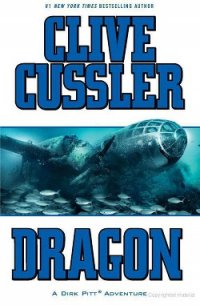Raise the Titanic - Cussler Clive (электронная книга .TXT) 📗
"It's possible a sudden shock might do it, but the geologists are in favor of separate overlapping shock waves. It's vibration we're after."
"Have we the explosives?" Pitt asked.
"The Bomberger carries nearly a ton for seismic research purposes," Spencer replied. "The Modoc has four hundred pounds in her stores for underwater salvage blasting."
"Will it do the trick?"
"Border line," Spencer admitted. "Another three hundred pounds would have given us a more acceptable margin for success."
"We could have it flown from the mainland by jet and air-dropped," Sandecker suggested.
Pitt shook his head. "By the time the explosives arrived, and were loaded in a sub and planted on the sea floor, it would be two hours too late."
"Then we'd best get on with it," Sandecker said brusquely. "We have a tight deadline to meet." He turned to Gunn. "How soon can the explosives be set in place?"
"Four hours," Gunn said unhesitatingly.
Sandecker's eyes narrowed. "That's cutting it pretty thin. That only leaves a leeway of fourteen minutes."
"We'll make it," Gunn said. "However, there is one condition."
"What is it?" Sandecker snapped impatiently.
"It will take every operational submersible we've got."
"That means pulling the Sappho II from its station beside the Deep Fathom," Pitt said. "Those poor bastards down there will think we're deserting them."
"There's no other way," Gunn said helplessly. "There's simply no other way."
Merker had lost all track of time. He stared at the luminous dial on his watch but his eyes couldn't focus on the glowing numbers. How long since the derrick had fallen across their buoyancy tanks, he wondered, five hours, ten, was it yesterday? His mind was sluggish and confused. He could only sit there without moving a muscle, breathing shallowly and slowly, each breath seemingly taking a lifetime. Gradually, he became aware of a movement. He reached out and touched Kiel and Chavez in the darkness, but they made no sound, no response; they had fallen into a lethargic stupor.
Then he became aware of it again, a minute but perceptible something that was not where it was supposed to be. His mind turned over as though it were immersed in syrup. But at last he had it. Except for the relentless rise of the water, there was no change, no sign of physical motion inside the flooding cabin; it was the angle of the Sappho II's light beam through the forward viewports that had dimmed.
He dropped off the bunk into the water-it came up to his chest now-and almost as if in a nightmare, he struggled toward the upper front ports and peered into the depths outside.
Suddenly, his numbed senses were gripped by a fear such as he had never known before. His eyes widened and glazed, his hands clenched in futility and despair.
"Oh Godl" he cried aloud. "They're leaving us. They've given us up."
Sandecker twisted the huge cigar he had just lit and continued to pace the deck. The radio operator raised his hand and the admiral turned in mid-step and came up behind him.
"The Sappho I reporting, sir," Curly said. "She's finished positioning her charges."
"Tell her to head topside as fast as her buoyancy tanks will take her. The higher she goes, the less pressure on her hull when the explosives detonate." The admiral swung and faced Pitt, who was keeping a watchful eye on the four monitors, whose cameras and floodlights were mounted in strategic spots around the Titanic's superstructure. "How does it look?"
"So far, so good," Pitt answered. "If the Wetsteel pressure seals hold up against the concussions, we'll stand a fighting chance."
Sandecker stared at the color images and his brow furrowed as he perceived great streams of bubbles issuing from the liner's hulk. "She's losing a lot of air," he said.
"Excess pressure escaping through the bleeder valves," Pitt said tonelessly. "We switched from the electrolyte pumps back to the compressors in order to cram as much extra air as we can into the upper compartments." He paused to fine-tune a picture and then continued. "The Capricorn's compressors put out ten thousand cubic feet of air an hour, so it didn't take long to raise the pressure inside the hull another ten pounds per inch, just enough to pop the bleeder valves."
Drummer ambled over from the computers and checked off a series of notations on a clipboard. "As near as we can figure, ninety per cent of the ship's compartments are unwatered," he said. "The main problem, as I see it, is that we have more lift than the computers say is necessary. If and when the suction gives way, she'll come up like a kite."
"The Sea Slug just dropped her last charge," Curly reported.
"Ask her to make a swing by the Deep Fathom before she starts for the surface," Pitt said, "and see if she can make visual contact with Merker and his crew."
"Eleven minutes to go," Giordino announced.
"What in hell is keeping the Sappho II?" Sandecker asked no one in particular.
Pitt looked across the room to Spencer. "Are the charges ready to fire?"
Spencer nodded. "Each row is tuned to a different transmitter frequency. All we have to do is turn a dial and they'll go off in their proper sequence."
"What do you bet we see first, the bow or the stern?"
"There's no contest. The bow is buried twenty feet deeper in the sediment than the rudder. I'm counting on the stern breaking free and then using its buoyant leverage to pull up the rest of the keel. She should rise on very nearly the same angle she sank-providing she's agreeable and rises at all."
"Last charge secured," droned Curly. "Sappho II is making her getaway."
"Anything from the Sea Slug?"
"She reports no visual contact with Deep Fathom's crew."
"Okay, tell her to hightail it toward the surface," Pitt said. "We fire the first row of charges in nine minutes."
"They're dead," . Drummer suddenly cried, his voice breaking "We're too late, they're all dead."
Pitt took two steps and gripped Drummer by the shoulders. "Cut the hysterics. The last thing we need is a premature eulogy."
Drummer dropped his shoulders, his face ashen and frozen in a stonelike expression of dread. Then he silently nodded and walked unsteadily back to the computer console.
"The water must only be a couple of feet from the sub's cabin ceiling by now," Giordino said. It came out about half an octave higher than his normal tone.
"If pessimism sold by the pound, you guys would all be millionaires," Pitt said dryly.
"The Sappho I has reached the safety zone at six thousand feet." This from the sonar operator.
"One down, two to go," murmured Sandecker.
There was nothing left to do now but wait for the other submersibles to rise above the danger level of the approaching concussion waves. Eight minutes passed, eight interminable minutes that saw the sweat begin to ooze on two dozen foreheads.
"Sappho II and Sea Slug now approaching safety zone."
"Sea and weather?" Pitt demanded.
"Four-foot swells, clear skies, wind out of the northeast at five knots," answered Farquar, the weatherman. "You couldn't ask for better conditions."




